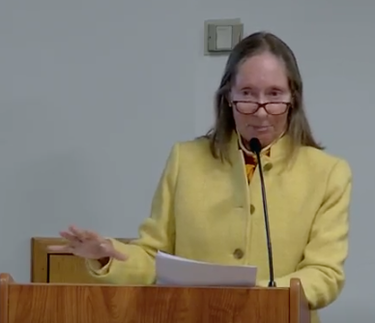Guilderland proposes six-month moratorium on large residential development
— Still frame from video of March 19, 2024 Guilderland Town Board meeting
“I personally am paying the taxes, $55,000 a year, just out of family pride. My family has been here since the 1920s and we built a lot of what is in this town,” Theresa Bohl told the town board of the “eyesore” properties at 2298 through 2314 Western Ave. She worried that a building moratorium would stymie a deal with a “quality buyer” but was assured the moratorium wouldn’t apply since the project is already in the pipeline.
GUILDERLAND — On April 16, Guilderland residents will have a chance to weigh in on a proposed building moratorium as a committee works to complete an update of the town’s comprehensive plan, adopted in 2001.
To encourage affordable housing and also to protect the town’s water quality and quantify, the draft says, the town board is proposing a six-month moratorium on subdivisions of five or more lots, apartment complexes of 25 or more units, and residential care facilities of 50 or more units.
The draft of the law outlines exceptions that the board may make for “extraordinary hardship” and says the moratorium may be extended for another six months.
Robyn Gray, who chairs the Guilderland Coalition for Responsible Growth and has come before the town board several times since last November to advocate for a moratorium, commended the board on March 19 for moving the matter forward.
Supervisor Peter Barber had repeatedly responded to Gray that the timing needed to be right for a moratorium. He said in February that would be once the committee updating the comprehensive plan had come up with recommendations.
“I just want to thank Ms. [Deputy Supervisor Christine] Napierski for the work she did on coming up with the local law for the moratorium and Mr. [Councilman Jacob] Crawford for coming out and stating that he felt there should be a moratorium on some of the building …,” Gray said on March 19. “It’s a little overdue in my opinion, but we’re there.”
Napierski responded of the draft, “It was started by the supervisor and then we worked on it together.”
At its March 19 meeting, the board considered two March 13 memos supporting the moratorium — one from the town’s planner, Kenneth Kovalchik, and the other from Bill Bremigen, Water and Wastewater superintendent, and Jesse Fraine, the town engineer.
Kovalchik wrote that a “predominant issue” for the community is “the need for affordable housing.” A primary draft recommendation for the comprehensive plan, he said, is to update zoning guidelines to “require major subdivisions and large developments to incorporate affordable housing options.”
At the board’s last meeting, March 5, its five members enthusiastically adopted a resolution to become a Pro-Housing Community.
Bremigen and Fraine wrote to the board in their memo, “While there is no immediate water shortage in the Town, the moratorium will allow the Water Department to further assess Town water infrastructure, water production capacities, and usage demand trends. This assessment will include looking for ways to increase the resiliency of the Town’s water system.”
Guilderland’s water-treatment plant can produce 2 million to 4 million gallons of water per day depending on the quality of the Watervliet Reservoir, they wrote. Most of the year, daily use is under 3 million gallons but, during the summer months, it spikes to 5 million to 7 million gallons. So in the summer, Guilderland relies on additional water from Albany and Rotterdam.
“If any of the interconnections with neighboring communities were restricted due to an emergency in that adjacent community, and it was during the high-water usage months, the Town could possibly have an issue keeping up with demand,” Bremigen and Fraine wrote.
They also said, “The single-family homes and apartment developments have the largest water usage. Single family homes typically have higher water usage than an apartment unit. This is largely driven by lawn sprinklers, pools, and other outdoor uses that are common parts of new single family home developments.”
Their memo concluded, “A pause on larger residential development will allow the Water Department to assess the current water system and allow for the Department to get a jump start on planning for the future.”
Public comment
While the formal hearing on the proposed moratorium is scheduled for 7 p.m. on April 16, several Guilderland residents addressed the board on the matter at the March 19 meeting.
Theresa Bohl identified herself as the “inherited major shareholder of Charles Bohl Inc., which is 2298 through 2314 Western Avenue — everyone’s favorite property.”
The string of unoccupied buildings includes a former dry cleaner, which has been declared a brownfield by the state’s Department of Environmental Conservation.
Bohl noted that her family hadn’t been the cause of the pollution, having bought the dry cleaners in 2011 to satisfy a potential buyer.
“Since 2013, I have been working with DEC and trying to get that site remediated … Everyone has kind of passed so I’m left holding the bag,” said Bohl.
“We have spent over a million dollars remediating the old gas-station site,” Bohl said.
She went on to say that the corporation that owns the properties, Charles Bohl Inc., is bankrupt and owes $1.5 million to a lender. “The property is selling for less than that and I stand to get zero out of it …,” said Bohl.
She went on, “I personally am paying the taxes, $55,000 a year, just out of family pride. My family has been here since the 1920s and we built a lot of what is in this town. And through that poor judgment of buying that dry cleaner, we’ve really been kind of pulled through the mud with it.”
She was addressing the board, Bohl said, because she has a “quality buyer” interested in the properties “with full eyes open” but she was concerned the moratorium would stymie the deal.
“This is kind of our last hurrah,” said Bohl.
John Haluska, who frequently addresses the board about “eyesore” properties in town, came with a 2015 Altamont Enterprise in hand, which detailed abandoned buildings. These included the Governor’s Motor Inn, the Nedco Pharmacy, and the Rustic Barn.
While those three buildings have all been removed, Haluska said his concern was the time it took to do so. Haluska said he hoped the section of the proposed moratorium law on hardship was a carve-out that would allow progress to be made on brownfields.
“I’d also like to have you consider a carve-out for small housing,” he said, referencing a proposal at the corner of Fuller Station and Carmen roads.
Paul Bowers, a Guilderland resident and real estate broker with Berkshire Hathaway, said of Bohl, “I … pray with her and other town residents that that property be excluded from the moratorium as would the property on Fuller Station Road.”
He said the Bohl properties were an eyesore and also that “there is a significant shortage of small homes in this community.”
Responding to Haluska’s comments further, Bowers said it can typically take up to eight years to foreclose on properties.
Later in the meeting, Barber said that the project for the Bohl properties would not be affected by the moratorium because it is already in the pipeline.
The proposal to build small rental homes and duplexes at Fuller Station Road will presumably be able to proceed, Barber said, “because it advances the idea of affordable housing.”
He added, “The devil is going to be in the details.”
Some towns, he said, define affordable housing as 120 percent of the median income while other towns use 70 percent.
Board discussion
Barber said that, at the April 16 public hearing on the moratorium, figures from the water department will be available showing “the average house uses five times as much water as an apartment just because they have a lawn.”
The water department, he said, is currently in the midst of replacing water meters in houses across town. “It will identify if there is a leakage, if there are improper uses of water,” Barber said. “You know, during the summer months, use of outdoor automatic sprinklers are only supposed to occur during the overnight hours not at 2 o’clock in the afternoon when it’s 95 degrees in a thunderstorm going on.”
While there is no emergency, Barber said, the moratorium will give the water department an “opportunity to further decide what’s the best path forward.”
This could include upgrading the wells that Guilderland had historically used, he said. The wells were shut down because of mineral infiltration and so far grant applications to pay for filtering have not been successful, said Barber.
He said of the wells, “If that came back to life, then a lot of the water purchases we make to Rottedam and the city of Albany would be greatly diminished and … even eliminated.”
Bowers noted, “Many of the homes here are older and are still using the five-gallon flush.”
When he’s hired “to go through an apartment complex,” said Bowers, “the first thing I look at is the water bill.” Changing toilets and aerators on sinks and showers makes a huge difference, he said.
Councilwoman Amanda Beedle noted the draft says that the town can extend the moratorium by six months as a whole or in two three-month segments.
“How is it triggered or measured?” Beedle asked.
Barber responded that the water department or the town planner could make the request or if “there’s some other reason that comes up” from the update committee.
If work is still underway on zoning changes, Napierski said, “We can give ourselves more time. It’s really up to us.”
“Moratoriums do stop things,” said Barber. “And so you’ve got to do it for a reason … you’ve got to do it at a time when the comp plan update is wrapping up and then also allow time for the new zoning laws potentially be adopted.”
He guessed the work wouldn’t be completed within six months. “We’ll probably have to extend it, for nine months,” he said.
“We’re not accepting new applications,” said Napierski. “But if it’s something that would be consistent with the goals of the new updated comprehensive plan or meets the criteria of one of the carve-outs here for brownfields, that’s something that the town board will look at and possibly allow to proceed.”
Crawford praised Barber and Napierski for the draft, calling it “spot on.”



